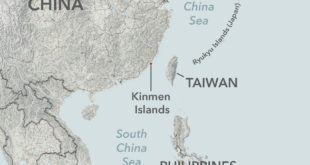Executives tried to explain themselves at Credit Suisse’s last AGM. KEYSTONE/© KEYSTONE / MICHAEL BUHOLZER In March 2023, Credit Suisse collapsed. An uncontrolled bankruptcy could only be prevented by big government aid and an emergency merger with competitor UBS. Switzerland is now waiting for a parliamentary inquiry report to reveal who was at fault as the bank disintegrated. For some, Credit Suisse’s management and ex-chairman Axel Lehmann are solely to blame for...
Read More »Should the US Congress Audit the Federal Reserve?
The Federal Reserve system, including its twelve regional district banks that issue our US currency, is a creature of Congress, which passed the Federal Reserve Act in 1913 to create our central bank. The Fed is neither part of the executive branch of the federal government, nor is it an independent federal agency within the government, although members of the Fed's Board of Governors are appointed by the Presidential and confirmed by Congress.The Fed's unique...
Read More »Strong US Retail Sales may Help Extend the Dollar’s Recovery
Overview: We have put emphasis on today's US retail sales report. A recovery from the weather-induced weakness in January should underscore the resilience of US demand after another 200k jobs were created and personal income jumped 1%. While the dollar has traded firmer in the first half of this week, given the 25 bp jump in the US two-year yield, its performance is somewhat disappointing. It is narrowly mixed in the European morning against the G10 currencies. The...
Read More »Covid: Four Years Later
On this week's Radio Rothbard, Ryan McMaken and Tho Bishop reflect on the fourth anniversary of the political response to covid and discuss if any meaningful lessons were learned, could something similar could happen again, and why it is right to still be furious with the tyranny American's experienced from a variety of fronts.Discussed on the Show "Covid Showed Us Who Really Rules America" by Ryan McMaken: https://Mises.org/RR_177_A"Modern Medicine’s...
Read More »Top 5 Most Bizarre Moments of Covid: A Student’s Recollection
In recognition of the fourth anniversary of the US government's response to covid, a Mises Apprentice shares their experience as a student during this tumultuous time, highlighting five dates they will never forget.5.) April 2022: “Despite the University’s policy to relax mask mandates and no longer require masks, we will have an open vote in our class next week if we will all ‘commit’ ourselves to continue mask requirements during this course.” I was told this by...
Read More »Critical Race Theory and the Courts: Judicial Injustice
In her dissenting opinion in the Supreme Court affirmative action case, Justice Ketanji Jackson began by announcing that “gulf-sized race-based gaps exist with respect to the health, wealth, and well-being of American citizens.”Justice Jackson argues that these race-based gaps are caused by legacies of oppression; in her view, the only question to be debated is how to eliminate those gaps. She considers it to be self-evident that race-based gaps are explained by...
Read More »American Policies Only Make Haiti Worse
Since the end of the Cold War, the US has overthrown Haiti’s government three times. In 1991 to remove President Jean-Bertrand Aristide from power. In 1994 to put Aristide back in. In 2004 to remove Jean-Bertrand Aristide again, followed by an invasion of Marines. This, followed by a 15-year United Nations occupation of the country. 20,000 American troops would bolster that occupation after the 2011 earthquake.The multinational occupation of the country introduced...
Read More »Biden Juiced Up, Ready To Go
Maybe he was born with it; maybe it’s amphetamine. Iconic Maybelline slogan aside, the consensus is that Dark Brandon was doped nicely for his State of the Union address.We have been seeing signs that old Joe is medically prepped for major public appearances. His shrill voice and barely suppressed rage is familiar to many of us who have elderly demented friends and relatives. The man is suffering, no doubt.The Bidens have staked a claim on public welfare, via...
Read More »Banning TikTok Will Not Make Americans Safer
On Wednesday, the House is set to vote on a bill introduced by Rep. Mike Gallagher (R-WI) that would ban or force the sale of the social video-sharing app TikTok. The bill is based on concerns that the Chinese Communist Party effectively controls ByteDance, the app's parent company. Last Friday, President Joe Biden endorsed the legislation and promised to sign it into law if Congress passes it.The vote comes nearly a year after the RESTRICT Act, the last major...
Read More »Consolidation Featured Ahead of Tomorrow’s US Retail Sales and Friday’s Japanese Wage News
Overview: We came into this week expecting the dollar to rise on the back of a recovery in rates. The two-year note has risen from 4.40% after the jobs report to 4.60%. The dollar's rise has been less impressive. The Dollar Index had begun with week with a six-day fall in tow. Today is it is rising for the third session. However, the gains have been a modest 0.80% off the pre-weekend lows. The dollar broadly is consolidating in narrow ranges thus far today in quiet...
Read More » Swiss Economicblogs.org
Swiss Economicblogs.org




